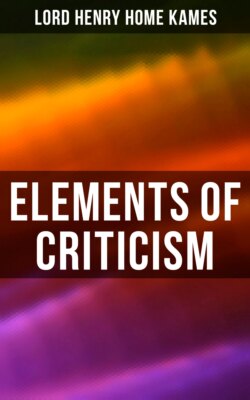Читать книгу Elements of Criticism - Lord Henry Home Kames - Страница 10
На сайте Литреса книга снята с продажи.
SECT. II.
ОглавлениеCauses of the emotions of joy and sorrow.
THis subject was purposely reserved for a separate section, because it could not, with perspicuity, be handled under the general head. An emotion involving desire is termed a passion; and when the desire is fulfilled, the passion is said to be gratified. The gratification of every passion must be pleasant, or in other words produce a pleasant emotion; for nothing can be more natural, than that the accomplishment of any wish or desire should affect us with joy. I cannot even except the case, where a man, through remorse, is desirous to chastise and punish himself. The joy of gratification is properly called an emotion; because it makes us happy in our present situation, and is ultimate in its nature, not having a tendency to any thing beyond. On the other hand, sorrow must be the result of an event contrary to what we desire; for if the accomplishment of desire produce joy, it is equally natural that disappointment should produce sorrow.
An event fortunate or unfortunate, that falls out by accident without being foreseen or thought of, and which therefore could not be the object of desire, raiseth an emotion of the same kind with that now mentioned. But the cause must be different; for there can be no gratification where there is no desire. We have not however far to seek for a cause. A man cannot be indifferent to an event that affects him or any of his connections. If it be fortunate, it gives him joy; if unfortunate, it gives him sorrow.
In no situation doth joy rise to a greater height, than upon the removal of any violent distress of mind or body; and in no situation doth sorrow rise to a greater height, than upon the removal of what makes us happy. The sensibility of our nature serves in part to account for these effects. Other causes also concur. We can be under no violent distress without an anxious desire to be free from it; and therefore its removal is a high gratification. We cannot be possessed of any thing that makes us happy, without wishing its continuance; and therefore its removal by crossing our wishes must create sorrow. Nor is this all. The principle of contrast comes in for its share. An emotion of joy arising upon the removal of pain, is increased by contrast when we reflect upon our former distress. An emotion of sorrow upon being deprived of any good, is increased by contrast when we reflect upon our former happiness.
Jaffier. There’s not a wretch that lives on common charity, But’s happier than me. For I have known The luscious sweets of plenty: every night Have slept with soft content about my head, And never wak’d but to a joyful morning. Yet now must fall like a full ear of corn, Whose blossom ’scap’d, yet’s wither’d in the ripening. Venice preserv’d, act 1. sc. 1.
It hath always been reckoned difficult to account for the extreme pleasure that follows a cessation of bodily pain; as when one is relieved from the rack, or from a violent fit of the stone. What is said, explains this difficulty in the easiest and simplest manner. Cessation of bodily pain is not of itself a pleasure; for a non-ens or a negative can neither give pleasure nor pain. But man is so framed by nature as to rejoice when he is eased of pain, as well as to be sorrowful when deprived of any good. This branch of our constitution, is chiefly the cause of the pleasure. The gratification of desire comes in as an accessory cause; and contrast joins its force, by increasing the sense of our present happiness. In the case of an acute pain, a peculiar circumstance contributes its part. The brisk circulation of the animal spirits occasioned by acute pain, continues after the pain is vanished, and produceth a very pleasant feeling. Sickness hath not that effect, because it is always attended with a depression of spirits.
Hence it is, that the gradual diminution of acute pain, occasions a mixt emotion, partly pleasant, partly painful. The partial diminution produceth joy in proportion; but the remaining pain balanceth our joy. This mixt feeling, however, hath no long endurance. For the joy that ariseth upon the diminution of pain, soon vanisheth; and leaveth in the undisturbed possession, that degree of pain which remains.
What is above observed about bodily pain, is equally applicable to the distresses of the mind; and accordingly it is a common artifice, to prepare us for the reception of good news by alarming our fears.
